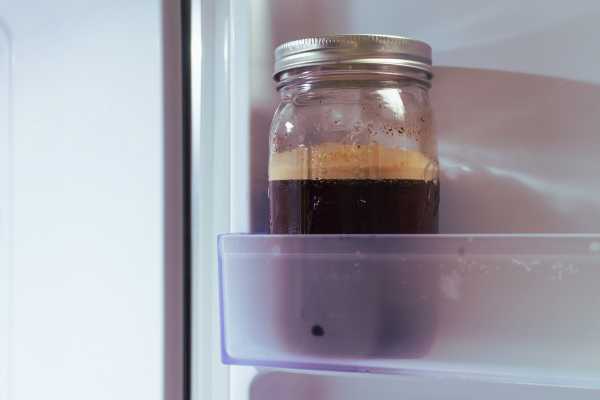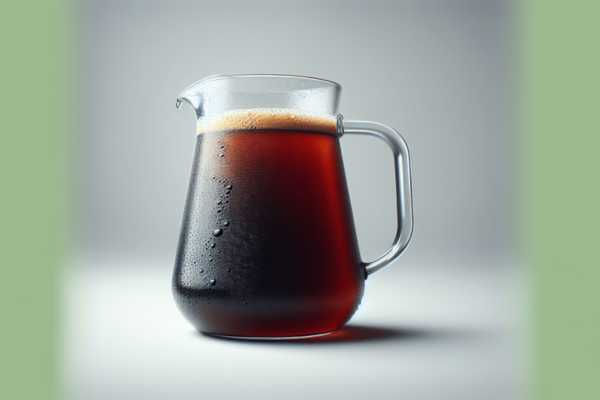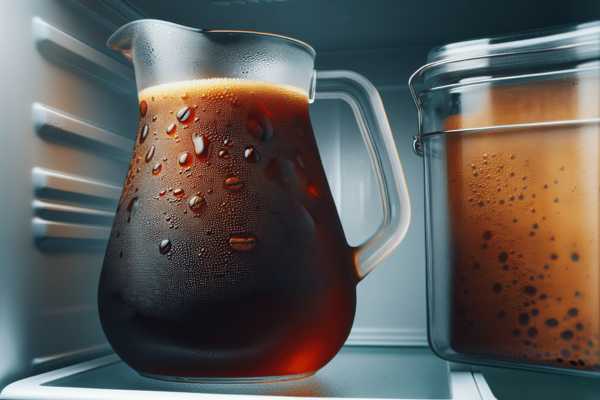Have you ever wondered how long does coffee last in the fridge before going bad? Well, fear not, because we have the answer for you! In this article, we will explore the how long does coffee last in the fridge and provide you with some helpful tips on maximizing its freshness. So, if you’re a coffee lover who enjoys keeping a stash of brewed coffee in the fridge for those busy mornings or late-night cravings, keep reading to find out all you need to know about how long does coffee last before you need to bid it farewell.
Storage of Brewed Coffee in the Fridge
Importance of proper storage
When it comes to storing brewed coffee in the fridge, proper storage is key to maintaining its freshness and quality. The way you store your coffee can greatly impact its taste, aroma, and overall enjoyment. By understanding the ideal conditions for storing brewed coffee, you can ensure that each cup you pour will be just as satisfying as the first.
Factors affecting the how long does coffee last
Several factors can affect how long does coffee last in the fridge. Oxygen, moisture, and temperature fluctuations are the main culprits that can lead to a decrease in freshness and flavor. Additionally, exposure to light can accelerate the degradation process. Understanding these factors will help you determine the best practices for storing your brewed coffee to maintain its quality for as long as possible.

Determining the Freshness of Brewed Coffee
Observing changes in color and aroma
One way to determine the freshness of brewed coffee is by observing changes in its color and aroma. Freshly brewed coffee typically has a dark, rich color, and a vibrant and enticing aroma. As time passes, the color may become duller, and the aroma may fade. If you notice significant changes in these aspects, it may be a sign that your brewed coffee is no longer at its peak freshness.
Taste and flavor indicators
Another indicator of brewed coffee freshness is its taste and flavor. A fresh cup of coffee should have a balanced and pleasant flavor profile. Over time, the taste may become more bitter or acidic, and the flavors may lose their complexity. Pay attention to any negative changes in taste or flavor, as they can be a clear indication that your brewed coffee is no longer at its best.
Optimal Temperature for Storing Brewed Coffee
Effects of temperature on coffee freshness
Temperature plays a crucial role in preserving the freshness of brewed coffee. When coffee is exposed to high temperatures, it can accelerate the oxidation process, resulting in a faster loss of flavor and aroma. On the other hand, extremely low temperatures can also have a negative impact on the taste and quality of coffee. It is important to find the optimal temperature range to keep your brewed coffee fresh for as long as possible.
Tip 1: Ideal temperature range
The ideal temperature range for storing brewed coffee in the fridge is between 35°F (1.7°C) and 45°F (7.2°C). This range helps to slow down the oxidation process while still maintaining a cool environment. It is important to note that the temperature should be consistent, as temperature fluctuations can cause condensation to form inside the container, leading to moisture exposure.
The ideal temperature range for storing brewed coffee in the fridge is between 35°F (1.7°C) and 45°F (7.2°C).
Effects of Oxygen and Moisture on Brewed Coffee
Why oxygen and moisture are detrimental to coffee
Oxygen and moisture are the enemies of brewed coffee freshness. When coffee is exposed to oxygen, it begins to oxidize, leading to a loss of flavor and aroma. Moisture, on the other hand, can cause the coffee grounds or brewed coffee to become stale and can also create an environment for mold or bacterial growth. It is important to minimize the exposure of brewed coffee to both oxygen and moisture to ensure its longevity.
Tip 2: Avoiding exposure to air and moisture
To prevent the negative effects of oxygen and moisture, it is crucial to store brewed coffee in airtight containers. This will create a barrier between the coffee and the outside environment, reducing the chances of oxygen and moisture infiltration. Additionally, keeping the container away from areas with high humidity, such as near the refrigerator door, can help further protect the brewed coffee from moisture damage.
The Role of Refrigeration in Extending Coffee Shelf Life
Beneficial effects of refrigeration
Refrigeration can play a significant role in extending how long does coffee last. The cold temperature helps to slow down the oxidation process, preserving the flavor and aroma for a longer period. With proper storage in the refrigerator, you can enjoy a fresh and delicious cup of brewed coffee even days after it was made.
Tip 3: Preventing bacterial growth
Refrigeration also helps to inhibit the growth of bacteria in brewed coffee. Bacterial growth can lead to spoilage and potential health risks. By keeping your brewed coffee chilled, you create an environment that is less conducive for bacteria to multiply, ensuring that your coffee is safe to consume for a longer period.
Recommended Duration for Storing Brewed Coffee in the Fridge
General guidelines for how long does coffee last it’s freshness
Brewed coffee is at its best within the first few hours of being made. However, with proper storage in the fridge, it can retain its freshness for up to 3-4 days. Beyond this timeframe, the quality and flavor will gradually diminish. It is important to note that these guidelines may vary depending on the type of coffee, brewing method, and personal preference.
With proper storage in the fridge, it can retain its freshness for up to 3-4 days.
Factors influencing how long does coffee last (storage time)
Several factors can influence the how long does coffee last and the storage time of brewed coffee in the fridge. The quality of the coffee beans or grounds, the brewing method used, and the specific storage conditions can all impact how long does coffee last and stay fresh. It is always best to trust your senses and pay close attention to any signs of spoilage when determining whether your brewed coffee is still good to consume.
Signs of Spoiled Brewed Coffee
Visual indicators of spoilage
One of the easiest ways to identify spoiled brewed coffee is through visual indicators. If you notice any mold growth, visible changes in color, or the presence of any foreign particles, it is a clear sign that your brewed coffee has gone bad and should be discarded immediately.
Off-flavor and off-odor detection
Spoiled brewed coffee will often exhibit off-flavors and off-odors. If your coffee tastes overly bitter, sour, or has an unpleasant taste, it is likely no longer suitable for consumption. Similarly, if the aroma has turned musty or foul, it is another indication of spoiled coffee.

Tips for Prolonging the Freshness of Brewed Coffee
Tip 4: Proper container selection
Choosing the right container for storing brewed coffee in the fridge is crucial for prolonging its freshness. Opt for containers that are airtight and opaque to minimize oxygen and light exposure. Glass, stainless steel, or BPA-free plastic containers with tight-fitting lids are excellent options for preserving the flavor and aroma of your brewed coffee.
Tip 5: Sealing techniques
In addition to using airtight containers, proper sealing techniques can further enhance the freshness of brewed coffee. Once the coffee has cooled, tightly seal the container to prevent any air or moisture from entering. Consider using plastic wrap or a layer of aluminum foil to create an extra barrier of protection before securing the lid. This will help maintain the quality of your brewed coffee for longer periods.
Tip 6: Alternative Methods for Preserving Brewed Coffee
Freezing as an option
If you want to extend how long does coffee last beyond a few days, freezing can be an option. However, it is essential to keep in mind that freezing the coffee may alter its flavor profile. To freeze brewed coffee, portion it into ice cube trays or airtight freezer bags and remove any excess air before sealing. When you’re ready to enjoy a cup, simply thaw and reheat the desired amount.
Pros and cons of freezing coffee
Freezing brewed coffee can have its pros and cons. On the positive side, it allows you to store large quantities of brewed coffee for a more extended period. However, freezing can also lead to flavor degradation and the loss of some of the coffee’s complexity. It is best to assess your priorities and preferences before deciding to freeze brewed coffee as a preservation method.
Best Practices for Reheating Brewed Coffee from the Fridge
Methods for reheating
When reheating brewed coffee, it is important to do so gently to avoid overheating or flavor loss. The most common methods for reheating brewed coffee include using a microwave, stovetop, or pouring hot water/coffee over the cold brewed coffee. Whichever method you choose, be sure to keep an eye on the temperature to prevent burning or altering the taste of your coffee.
Avoiding overheating or flavor loss
To avoid overheating the coffee or sacrificing its flavor, make sure to reheat it slowly. Use short bursts of low to medium heat if using a microwave and stir occasionally to distribute the heat evenly. If using a stovetop, heat the coffee over low heat and remove from the heat source just before it reaches your desired temperature. By exercising caution and reheating with care, you can enjoy a hot cup of coffee without compromising its flavor.
In conclusion, storing brewed coffee in the fridge requires proper attention to maintaining its freshness and quality. By considering factors such as temperature, exposure to oxygen and moisture, and utilizing proper storage techniques, you can prolong the shelf life of your brewed coffee and enjoy flavorful cups even days after brewing. Take the time to follow the recommended guidelines, and you’ll savor every sip of your refrigerated brewed coffee.
Frequently Asked Questions (FAQs)
How long can ground coffee last?
It depends on various factors such as storage conditions and the type of packaging. Generally, ground coffee can last for about 2-5 months if stored in an airtight container in a cool, dark place. However, for the best flavor and aroma, it’s recommended to use the coffee within a month of grinding.
Does coffee expire if unopened?
Coffee does not technically expire if unopened, but it does lose its freshness over time. Ground coffee can last 3-5 months, while whole bean coffee can last 6-9 months if stored properly in a cool, dark place. However, for the best flavor, it’s recommended to consume coffee within 2-4 weeks of opening the package. So, while it won’t go bad, it’s always best to enjoy your coffee sooner rather than later.
How many hours can coffee sit out?
Coffee can last for up to 12 hours when left at room temperature. After that, it is recommended to refrigerate or discard the coffee to ensure freshness and prevent bacterial growth.
Further Reading…
- Discover How Much Caffeine In An Espresso Shot
- Starbucks Cup Sizes – How to Choose Your Perfect Cup Size
- Decoding Ristretto vs Long Shot: Unveiling the Secrets of espresso
- Easy Whipped Coffee Recipe – Elevate Your Morning Routine
- Tips for Perfect Heavy Whipping Cream in Coffee Experience
- Can You Eat Coffee Grounds? Facts, Safety and Benefits
- Is Coffee Good For Sore Throat? Discover the Effects
- Perfect Scoop-to-Cup Ratio: How Many Scoops Of Coffee For 12 Cups


